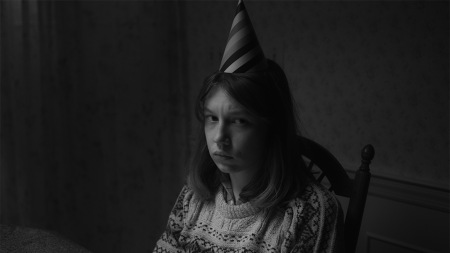Fantasia Reviews: Stay Online and Hippo
Stay Online
Stay Online happens at high speed. Clicking from one social messaging app to another, from one app to another, the audience joins Katya (Liza Zaitseva) who stays her apartment in Kyiv in the early days of Russia’s invasion of Ukraine. She sits behind a donated laptop, constantly getting warnings for air raids and news updates about Marioupol and other places. She wants to stay in constant touch with the people closest to her: her friend Ryan who is volunteering, her brother who has joined the army, and her mother. The laptop is a donation intended for her brother and Katya is adding an app for him that can geolocate any cell phone by entering its phone number.
Since Katya is using the former laptop’s owner’s apps to connect with her friends and family, she gets a call from Andriyi’s 8 year old son, Sava. Sava’s parents are missing and he’s been placed in a children’s shelter in Lviv. Katya gets involved in trying to locate and reunite the boy with his parents using the geolocation app and other social media.
Stay Online is a fascinating study in how stories can be told through messages and short conversations via social media. We feel tension as Katya waits to see checkmarks that her messages are delivered and read, and green circles to show someone is on line. The films shows that a full length feature is not only successfully carried by this limited perspective, but it builds and creates tension while conveying how life during wartime is deadly and full of sacrifices. Stay Online is the first film to be made in the Ukraine since the invasion and writer/directors Yeva Strielnikova and Anton Skrypets do a fantastic job using what is available to them.
Hippo
The coming-of-age story touched with elements of Greek tragedy Hippolytus gets a Mark H. Rapaport treatment. Expect twisted humour and deranged characters that are hilariously perverse. Set in the 1990s, Buttercup (Lilla Kizlinger) and her brother Hippo (Kimball Farley) live in isolation with their mother Ethel (Eliza Roberts) in a suburban house. Hippo spends his days playing video games and indulged by his mother who never responds in quite the way one expects to his outlandish demands. Adopted after her parents died in Hungary, 17-year-old Buttercup longs for a child. After being spurned by Hippo, she turns to Craigslist’s personals to find her mate and Ethel insists that Buttercup bring her date over for dinner. That’s when things really get weird.
The dysfunctional, almost dystopian in their isolation, suburban family makes for satisfying viewing for those who miss the comic darkness of Todd Solondz’ realities. In a similar way, the limitations of the characters drive the film forward as the situation around them disintegrates because of their identities. While a life of isolation may have been good enough for children, it’s something all three are bumping up against as the sexuality of young adulthood hits. Hippo begins to construct his adult identity based on a character in his video game, seeking automatic weapons and dying his hair blond. He takes to commando style actions, firing a crossbow at a variety of objects at a distance. The gloomy Buttercup seems victim of the fate of having grown up in this cage, and even when the door is open for her to leave, she remains inside it, drawn by her love of Hippo. Ethel’s inability to explain sexuality and relationships to her two stunted children coupled with her love for her deceased husband is a smart juxtaposition. The arrival of Buttercup’s date, who outside of this isolated world would be an outcast, yet inside of it seems like the most normal of the three, is another masterstroke of character.
All in all the film is darkly funny. With its black and white palette, almost like an anti-Wes Anderson film, the dysfunctional family in isolation calls to mind the isolation of the pandemic. Our greatest enemies are not from without, but from within.
Hippo and Stay Online appeared as part of the Fantasia Festival, which continues until August 9. Tickets and information on shows can be found HERE.






